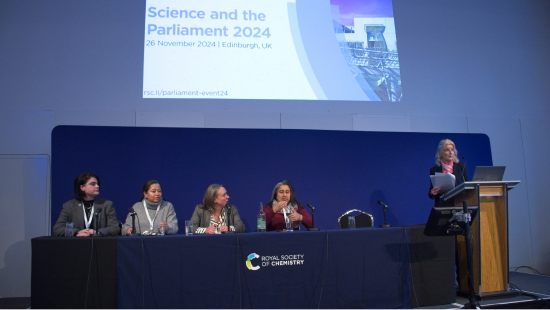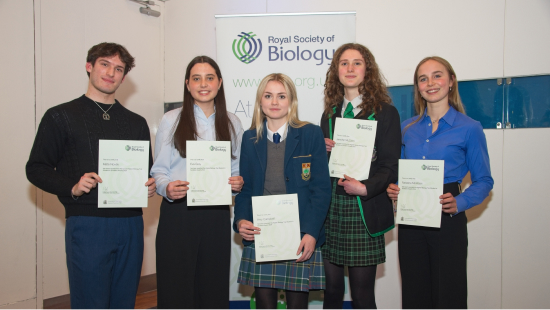News
RSB attends Science and the Parliament 2024 conference – with biology awards ceremony
- Details
- 05 December 2024
The Royal Society of Biology attended the 24th annual Science and the Parliament event at Dynamic Earth in Edinburgh on Tuesday 26 November 2024.
Organised by the Royal Society of Chemistry (RSC), Science and the Parliament aims to foster close relations with policymakers and key stakeholders on behalf of, and in cooperation with, the science, engineering, and technology community, with a particular focus on Scottish relations.

Panel discussion (L-R): Dawn McAra-Hunter (Scottish AI Alliance), Dilraj Sokhi-Watson (Equate Scotland), Dr Alicia Greated (CaSE), Dr Hina Khan (Craft Prospect), Dr Annette Doherty (RSC).
Learned societies, academic institutions, and professional bodies came together with the opportunity to network and demonstrate their recent activity in the exhibition space. This year’s theme was centred on the future of STEM and featured three panel discussions followed by the presentation of awards to top school students across Scotland in STEM subjects.
President of the RSC, Dr Annette Doherty, gave the welcoming address, followed by a keynote address from Richard Lochhead MSP, Minister for Business in the Scottish Government. Both highlighted the critical role of science and technology to the UK workforce and that these fields need to be at the heart of our national agenda. Emphasis was also placed on the importance of educating and fostering the next generation, and acknowledging the curriculum reform currently underway across the UK.
The first panel discussion was geared towards innovation and technology development and featured the following speakers:
- Dr Alicia Greated – Executive Director at Campaign for Science and Engineering (CaSE)
- Dilraj Sokhi-Watson – Director at Equate Scotland
- Dr Hina Khan – Head of Commercial at Craft Prospect
- Dawn McAra-Hunter – Programme Manager at Scottish AI Alliance
The key takeaways included R&D having a central role in underpinning the UK’s industrial strategy and that this is vital to growing the economy. It was noted that while improvements have been made with regard to diversity and equality in the STEM workforce, more still needs to be done, with mental health being a key aspect that also needs support.
The second panel discussion, chaired by Ken Macdonald, highlighted the need for continuation along the STEM pipeline and the value of ethical literacy with the following speakers:
- Dr Stephen Hendry – Programme Manager, Socio-economic Inclusion at RSC
- Professor Martin Hendry – Chair, Learned Societies Group and Vice President and Clerk of Senate at the University of Glasgow
- Sean McNamara – Director at CILIPS
Fostering critical thinking in young people by giving them the tools to be able to deduce fact from fake news was high on the agenda as this is a notable issue facing everyone, but in particular young people and their path to learning and building knowledge today. The role and importance of libraries for learning, AI literacy, and media literacy was also covered, and how beneficial these resources are from an early age for the STEM pipeline.
The final panel discussion featured discussion points on how best to encourage young people to pursue the life sciences from an early age with the following speakers:
- Rebecca Wright – Lecturer in Biomedical Sciences at Robert Gordon University
- Dr Stuart Farmer – Learning and Skills Manager at the Institute of Physics (IOP)
- Dr Sineád Rhodes – Senior Research Fellow at The University of Edinburgh
Further emphasis was put on the opportunities available to students, supporting young people’s career development, the importance of maintaining a steady stream of suitably trained professionals across every skill set, and what it means to be a scientist today.
Following this was the presentation of prizes for the highest awarded students based on SQA results for Higher and Advanced Higher STEM subjects, presented by representatives from the RSB, RSC, IOP, Royal Scottish Society of Arts, and the Edinburgh Geological Society.
Out of over 4,000 students across Scotland studying Higher Biology, three came joint first for the highest score for the subject – Eva Gray from Boroughmuir High School, Natasha Morrison from Prestwick Academy, and Amy Campbell from The High School of Glasgow. The top prize for Higher Human Biology was awarded to Jennifer McCann from St Maurice’s High School, and claiming the top Advanced Higher Biology prize was Máté Novák from Bo’ness Academy.

Award winners (L-R): Máté Novák (Bo’ness Academy), Eva Gray (Boroughmuir High School), Amy Campbell (The High School of Glasgow), Jennifer McCann (St Maurice’s High School), Natasha Morrison (Prestwick Academy).
Concluding the day was a buffet dinner with networking between educators, policymakers, and industry professionals, with the opportunity to reflect on the achievements of the very deserving award winners.

